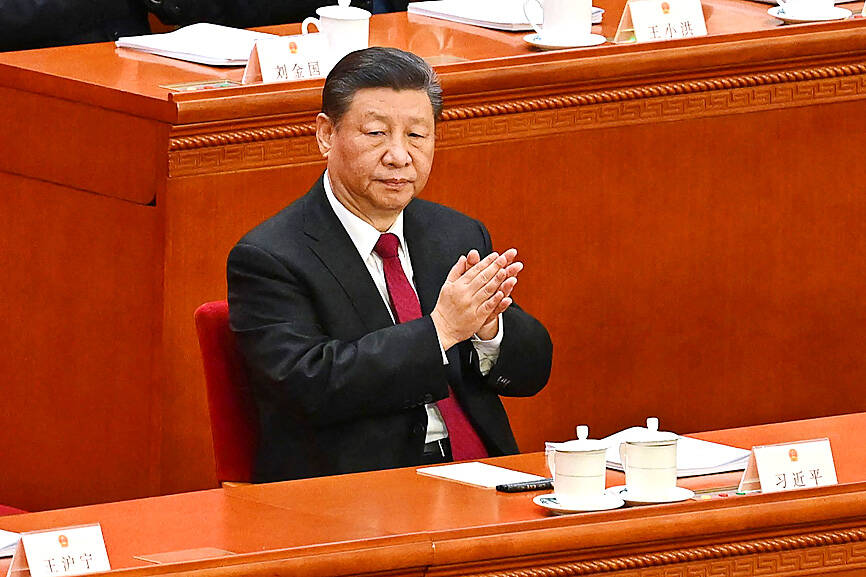Chinese President Xi Jinping (習近平) on Wednesday called for the mobilization of “patriots” in Taiwan and abroad to fend off pro-Taiwanese independence efforts in a meeting tied to China’s highest profile annual political gathering.
Xi met with the Revolutionary Committee of the Chinese Kuomintang (中國國民黨革命委員會), a political group that is based in China and distinct from the Chinese Nationalist Party (KMT).
Xi urged the group, an ally of the Chinese Communist Party (CCP), to unite “all patriots from home and abroad, in and out of Taiwan” to step up opposition to Taiwanese independence and to advance the “peaceful reunification” of China.

Photo: AFP
The phrase “peaceful reunification,” widely seen as a benign sign of China’s policy approach toward Taiwan, was missing from this year’s government work report earlier this week.
The report did pledge to implement the CCP’s Taiwan strategy, signaling that Xi’s words are a more authoritative guide to China’s attitude toward the nation.
Xi during the meeting called for deeper cooperation with Taiwan in technology, agriculture, culture and youth development, China’s state news agency Xinhua said in a readout on his meeting.
It was held on the sidelines of the 14th National Committee of the Chinese People’s Political Consultative Conference, a component of the so-called “two sessions” annual gathering of China’s government.
The CCP typically utilizes a dual narrative when dealing with Taiwan, National Policy Foundation associate researcher Lee Cheng-hsiu (李正修) told Radio Free Asia.
Beijing would emphasize “reunification” or “opposing independence” depending on the situation, Lee said.
“Due to the current lack of mutual trust in cross-strait relations, the DPP’s third consecutive presidential term is about to begin. So in this situation, the CPP will emphasize ‘opposing independence’ in its Taiwan policy for at least the next four years,” he said.
The harder line on Taiwan taken up by Chinese Minister of Foreign Affairs Wang Yi (王毅) yesterday does not conflict with Xi’s softer comments during the Wednesday meeting, because Xi leaves the tougher rhetoric to his underlings, enabling Beijing to maintain a two-pronged approach, Lee added.

SHIPS, TRAINS AND AUTOMOBILES: The ministry has announced changes to varied transportation industries taking effect soon, with a number of effects for passengers Beginning next month, the post office is canceling signature upon delivery and written inquiry services for international registered small packets in accordance with the new policy of the Universal Postal Union, the Ministry of Transportation and Communications said yesterday. The new policy does not apply to packets that are to be delivered to China, the ministry said. Senders of international registered small packets would receive a NT$10 rebate on postage if the packets are sent from Jan. 1 to March 31, it added. The ministry said that three other policies are also scheduled to take effect next month. International cruise ship operators

HORROR STORIES: One victim recounted not realizing they had been stabbed and seeing people bleeding, while another recalled breaking down in tears after fleeing A man on Friday died after he tried to fight the knife-wielding suspect who went on a stabbing spree near two of Taipei’s busiest metro stations, Taipei Mayor Chiang Wan-an (蔣萬安) said. The 57-year-old man, identified by his family name, Yu (余), encountered the suspect at Exit M7 of Taipei Main Station and immediately tried to stop him, but was fatally wounded and later died, Chiang said, calling the incident “heartbreaking.” Yu’s family would receive at least NT$5 million (US$158,584) in compensation through the Taipei Rapid Transit Corp’s (TRTC) insurance coverage, he said after convening an emergency security response meeting yesterday morning. National

PLANNED: The suspect visited the crime scene before the killings, seeking information on how to access the roof, and had extensively researched a 2014 stabbing incident The suspect in a stabbing attack that killed three people and injured 11 in Taipei on Friday had planned the assault and set fires at other locations earlier in the day, law enforcement officials said yesterday. National Police Agency (NPA) Director-General Chang Jung-hsin (張榮興) said the suspect, a 27-year-old man named Chang Wen (張文), began the attacks at 3:40pm, first setting off smoke bombs on a road, damaging cars and motorbikes. Earlier, Chang Wen set fire to a rental room where he was staying on Gongyuan Road in Zhongzheng District (中正), Chang Jung-hsin said. The suspect later threw smoke grenades near two exits

The Forestry and Nature Conservation Agency yesterday launched a gift box to market honey “certified by a Formosan black bear” in appreciation of a beekeeper’s amicable interaction with a honey-thieving bear. Beekeeper Chih Ming-chen (池明鎮) in January inspected his bee farm in Hualien County’s Jhuosi Township (卓溪) and found that more than 20 beehives had been destroyed and many hives were eaten, with bear droppings and paw prints near the destroyed hives, the agency said. Chih returned to the farm to move the remaining beehives away that evening when he encountered a Formosan black bear only 20m away, the agency said. The bear